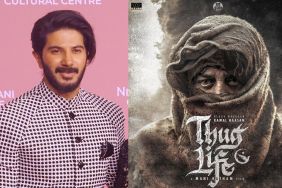
Terrence Malick is a filmmaker like none other. You don’t walk into a Malick film expecting the norm, you expect to be transported — emotionally and visually. In this regard The Tree of Life is Malick’s most ambitious and experimental film yet. It is also his least cohesive. While visually jaw dropping, Malick introduces several concepts that never really come together. Instead they linger as each is whispered throughout. It’s a film I’m sure will benefit from repeat viewings, but upon the first screening the multiple themes don’t really add up. Yet, I don’t think now is the time to make a final judgment.
Steeped in religion, the Book of Job more specifically, The Tree of Life opens with verses 38:4,7, portions of a chapter in which God is reminding Job of his power and his creating the foundations of Earth from the sea to the stars. In watching The Tree of Life you bear witness to this creation in conjunction with other elements from the Book of Job in general, including the questioning of the fairness of God, innocence versus wickedness and human suffering.
The film opens as Mr. and Mrs. O’Brien (Brad Pitt and Jessica Chastain) are informed of the death of one of their three sons. The nature of his death is not entirely clear, but this is the first instance in which the fragility of life is alluded to. It will be revisited often.
Moving 40 or so years into the future, we next find ourselves among giant glass towers and the concrete jungle where we find the eldest of the O’Brien sons, Jack (Sean Penn), now grown and working as an architect. It is the anniversary of his brother’s death and we catch brief snippets of a phone call he’s having with his father, apologizing for things from the past and clearly distraught.
At this point we haven’t exactly bear witness to anything life shattering. Malick’s photography, working with cinematographer Emmanuel Lubezki, is stunning as always. The score from Alexandre Desplat soars and whispered voiceover suggests additional themes to consider. But really, nothing could prepare you for what is to come.
For what seemed like about 20 minutes, the creation of the universe plays out before your eyes as the cosmos shift and change, volcanoes erupt and dinosaurs walk the earth. It’s a creative counterpart to the star-filled embryonic fluid of the infinite found in Kubrick’s 2001. Without much embellishment, this is a sequence that equals a modern day pinnacle of filmmaking.
The rafters of the 2,300 seat Grand Theatre Lumiere literally shook as molten lava spewed from the Earth’s surface during the film’s first screening here at the Cannes Film Festival where I had what is arguably the absolute best seat in the house. Accompanied by Desplat’s score, it’s a sequence that will wow audiences no matter what they think of the rest of the film. It could win a short film Oscar were it be plucked from Tree of Life‘s 138-minute running time and presented on its own.
As time plays out, the film soon settles, once again, on the O’Briens, this time twenty years prior to our first introduction as we enter their life sometime during the 1950s. We begin with dreamy visions of Mr. and Mrs. O’Brien in love, which then moves to the birth of Jack (Hunter McCracken) whose life is really at the core of The Tree of Life more than any other.
Told in short bursts, the film never focuses on a narrative as much as we get brief glimpses into life with the O’Briens. Jack is soon surrounded by two brothers (Laramie Eppler and Tye Sheridan), and while the relationship between these brothers plays a part, it’s the effect their father has on them that really shapes the film.
Early on, voice over by Jessica Chastain’s Mrs. O’Brien alludes to the idea that there are only two ways through life; a) “Nature,” the idea of survival of the fittest, or b) “Grace,” the more spiritual and loving route. These two ideals represent Mr. and Mrs. O’Brien with Pitt playing a strict, 1950s era father while Chastain plays a more passive and nurturing role in their children’s upbringing. Through this style of parenting, Jack and his two brothers become afraid of their father and search out their mother for the love they desire, though the love both parents have for their children is evident from a non-partial audience member’s perspective.
As time passes boys will be boys, arguments will be had, mistakes will be made and the fragility of life is again on display. Perhaps what’s most important to take away is what kind of effect parenting has on Jack in how he treats others and how he acts out. But added to this idea are the consistent conversations the characters have with God as they search for meaning and reason for why things happen, a tie this segment of the film shares with the opening scene as the O’Briens wonder why God could take their innocent child from them… Is it fair? Is anything in life?
Finally, the last segment of the film I will leave for you to see and interpret for yourself. This isn’t to say the film holds itself together until the end as much as the ending adds just one more layer to a film filled with layers, some that will come to you immediately, others that will come to you the more you explore. It’s not a film concerned with story as much as it values concepts and ideas.
This isn’t an actor’s film, though Brad Pitt is excellent as he’s given the bulk of the performance duties as the brutish father while Chastain is often seen twisting in the wind framed by peek-a-boo moments of sunlight. Sean Penn as the adult Jack is also not given a whole lot to do other than explore the expanse around him with wide-eyed wonder and disillusion leading up to the film’s final moments.
For those that love Malick regardless you are going to find the visual style he has brought to all of his films, more specifically The Thin Red Line and The New World, but this is more a piece of visual poetry compared to the narratives Malick has presented in the past. It’s a film with a spiritual energy represented by an orange fractal that divides the film into a mixture of art forms grand in scale and epic in scope.
It’s hard for me to decide what more can be said about a film that explores the roots of humanity’s relationship with God through a cosmic exploration of life. Just as this film took 40 years to make, it may be another 40 years before I’m ever able to come to a final conclusion on what it entirely means to me.










